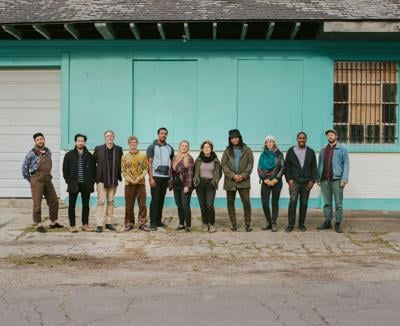Blues singer Bessie Smith’s “Backwater Blues” is often connected to the well-known Great Mississippi Flood of 1927, which devastated predominantly Black communities in Arkansas, Mississippi and Louisiana. But while Smith’s song was released in early 1927, it was originally about a 1926 flood near Nashville, Tennessee.
In the almost 100 years since its release, though, that detail has faded. “Backwater Blues” could be associated with countless stories of watching floods devastate homes and livelihoods.
“Lord, when you send the rain,” the newest album by Byron Asher’s Skrontch Music, features an instrumental recomposition of “Backwater Blues.” It is immediately preceded by a tumultuous original titled “The Break” and an audio sample of a woman, Pamela Mahogany, sharing her experience of Hurricane Katrina and the federal levee failures.
“You can’t recompose ‘Backwater Blues,’ which is about floods, and you can’t be living in New Orleans, where there’s a constant threat of flooding, and not consider Katrina and hurricanes in this context,” Asher says. “There’s so much resonance from the text of ‘Backwater Blues’ to Katrina and backward.”
Central to “Lord, when you send the rain,” which is out Friday, April 19, on Sinking City Records, is the way the blues transcends, but can still tie together, time periods or places. The eight-song album is influenced by traditional blues music — from its early years when it traveled from the Mississippi Delta to New Orleans at the beginnings of jazz — but it is also contemporary and experimental, with free improvisation and the use of audio samples.
Asher, a clarinetist and saxophonist and adjunct professor at the University of New Orleans, brought together a large ensemble of considerable musicians on the album, including reeds players Aurora Nealand, Reagan Mitchell and Ricardo Pascal; cornetist Shaye Cohn; trombonist Emily Frederickson; sousaphone player Steve Glenn; pianist Oscar Rossignoli; bassist James Singleton; drummer Doug Garrison; and Peter Bowling with live electronics. They recorded the album at Esplanade Studios with engineer Misha Kachkachishvili, and guitarist and UNO jazz studies chair Brian Seeger produced and edited "Lord, when you send the rain" with Asher. Grants from UNO's department of music, the New Orleans Jazz & Heritage Foundation and the Threadhead Cultural Foundation supported the production.
It’s broader than music, though, says Asher, citing scholar Clyde Woods’ term “blues epistemology.” Blues is a worldview born from Black communities and is an act of resistance against white supremacy and economic exploitation.
It’s “much greater than the 12-bar musical form,” Asher says. “You can think about how much of Black American music, of jazz music, of the things we’re playing here in New Orleans every day sonically relates to the blues. And then every time you play a blues, to think about the relationship to deep resistance.”
“Lord, when you send the rain,” a quote from a 1989 James Baldwin poem, grew out of Asher’s first Skrontch Music project, released in 2019. That album focused on how the history of New Orleans jazz was intertwined with anti-racist activism in early 20th century Creole communities — a history that echoed in 2015 and 2016 amid Black Lives Matter protests.
Blues history was an important part of that original work, and Asher says he wanted to continue to follow the thread. He began composing his new pieces in 2018 during a MacDowell residency.
Inspired by Angela Davis’ book “Blues Legacies and Black Feminism,” which focuses on Ma Rainey, Bessie Smith and Billie Holiday, Asher’s first pieces for the album were recompositions of Smith’s “Backwater Blues” and Rainey’s “Louisiana Hoodoo Blues” and “Barrelhouse Blues.” For each song, Asher set the lyrics to original music, then removed the lyrics for the new instrumental compositions.
The other tracks on the album are wholly original compositions, which build on the blues connections. The joyful song “Threads,” which features a solo by Nealand, also incorporates Caribbean influences in a way that draws a line from the Mississippi Delta to the Caribbean — with New Orleans in the middle.
The Skrontch Music ensemble debuted the music at the Broadside in 2021, and Asher hopes to bring the album back to the stage later this year.
“This is just my take on this music, but [blues] and its history permeates all of the music that is made in New Orleans today,” Asher says.
Asher's free jazz project Basher also releases a new album, “May Day,” on May 31. He can be seen on Mondays at Bacchanal, and he co-curates the Progression Music Series every last Thursday of the month at The Tigermen Den. Find more at byronasher.com.
There have been only a couple of ChazFests since a decade-long run ended in 2015.
Keep up with the latest at calendar.gambitweekly.com.






